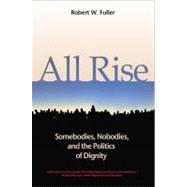
Note: Supplemental materials are not guaranteed with Rental or Used book purchases.
Purchase Benefits
| INTRODUCTION: What Is Rankism? | 1 | (12) | |||
|
1 | (1) | |||
|
2 | (1) | |||
|
3 | (2) | |||
|
5 | (4) | |||
|
9 | (1) | |||
|
10 | (3) | |||
| CHAPTER 1: What's at Stake | 13 | (8) | |||
|
13 | (2) | |||
|
15 | (4) | |||
|
19 | (2) | |||
| CHAPTER 2: Dignity and Recognition | 21 | (14) | |||
|
22 | (2) | |||
|
24 | (4) | |||
|
28 | (2) | |||
|
30 | (2) | |||
|
32 | (3) | |||
| CHAPTER 3: Models of Dignity | 35 | (16) | |||
|
35 | (1) | |||
|
36 | (2) | |||
|
38 | (5) | |||
|
43 | (1) | |||
|
44 | (3) | |||
|
47 | (4) | |||
| CHAPTER 4: Dignity in the Workplace | 51 | (24) | |||
|
52 | (13) | |||
|
65 | (5) | |||
|
70 | (3) | |||
|
73 | (2) | |||
| CHAPTER 5: Dignity in Education | 75 | (18) | |||
|
75 | (2) | |||
|
77 | (3) | |||
|
80 | (4) | |||
|
84 | (4) | |||
|
88 | (1) | |||
|
89 | (4) | |||
| CHAPTER 6: Rankism Can Be Harmful to Your Health | 93 | (8) | |||
|
93 | (1) | |||
|
94 | (1) | |||
|
95 | (3) | |||
|
98 | (3) | |||
| CHAPTER 7: The Social Contract in a Dignitarian Society | 101 | (8) | |||
|
101 | (1) | |||
|
102 | (2) | |||
|
104 | (5) | |||
| CHAPTER 8: The Politics of Dignity | 109 | (12) | |||
|
110 | (1) | |||
|
111 | (2) | |||
|
113 | (3) | |||
|
116 | (5) | |||
| CHAPTER 9: A Culture of Dignity | 121 | (22) | |||
|
122 | (1) | |||
|
123 | (4) | |||
|
127 | (4) | |||
|
131 | (2) | |||
|
133 | (7) | |||
|
140 | (3) | |||
| CHAPTER 10: Globalizing Dignity | 143 | (14) | |||
|
143 | (1) | |||
|
144 | (1) | |||
|
145 | (3) | |||
|
148 | (1) | |||
|
149 | (4) | |||
|
153 | (4) | |||
| CHAPTER 11: Religion in a Dignitarian World | 157 | (10) | |||
|
158 | (1) | |||
|
158 | (2) | |||
|
160 | (3) | |||
|
163 | (2) | |||
|
165 | (2) | |||
| CHAPTER 12: The Stealth Revolution | 167 | (6) | |||
|
168 | (1) | |||
|
168 | (3) | |||
|
171 | (2) | |||
| AFTERWORD: All Rise for Dignity | 173 | (6) | |||
|
173 | (6) | |||
| Notes | 179 | (11) | |||
| Resources | 190 | (3) | |||
| Acknowledgments | 193 | (2) | |||
| Index | 195 | (9) | |||
| About the Author | 204 |
The New copy of this book will include any supplemental materials advertised. Please check the title of the book to determine if it should include any access cards, study guides, lab manuals, CDs, etc.
The Used, Rental and eBook copies of this book are not guaranteed to include any supplemental materials. Typically, only the book itself is included. This is true even if the title states it includes any access cards, study guides, lab manuals, CDs, etc.